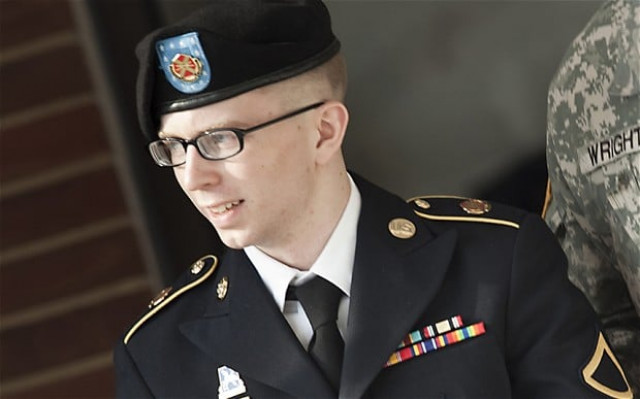US trial of Manning, the WikiLeaks source, at final stage
If he is acquitted on aiding the enemy, Manning faces a possible sentence of 154 years behind bars.

Manning, faces a possible life sentence for "aiding the enemy" by releasing a vast cache of classified files to WikiLeaks. PHOTO:AFP
Three years since Manning's arrest in Iraq over what officials call the biggest national security leak in America's history, his defense lawyer, David Coombs, and prosecutor Major Ashden Fein will have one last chance to make their case before a military judge delivers a verdict.
The 25 year old former intelligence analyst already has admitted to leaking hundreds of thousands of classified documents to the antisecrecy website WikiLeaks. But he is fighting more serious charges, including the most serious count that he knowingly assisted al Qaeda through his massive document dump.
The court martial has taken on new significance in the wake of dramatic revelations from another young man working with classified information, Edward Snowden, a former intelligence contractor who recently blew the lid on US surveillance of phone records and Internet traffic.
The outcome of Manning's trial could have an impact on the case against Snowden, if he is ever extradited after having fled to Moscow via Hong Kong.
The court martial has played out under heavy security northeast of Washington at Fort Meade, Maryland, home to the sprawling headquarters of the National Security Agency, which used to employ Snowden as an IT contractor.
Born in Oklahoma to an American father and Welsh mother who later divorced, the slightly built, bespectacled Manning has portrayed himself as a truth teller who leaked a cache of diplomatic cables and military intelligence reports to shed light on US foreign policy excesses.
Manning, exuding a quiet determination, has told the court he believed the reports he saw in his job "needed to be shared with the world" and that it "would help document the true cost of the wars in Iraq and Afghanistan."
The government, however, has offered a different picture of a reckless traitor who violated his duty as a soldier and who knew from his training that the leaked information could fall into the hands of al Qaeda.
To back up their argument, prosecutors asserted the late al Qaeda leader Osama bin Laden asked an underling to retrieve documents online that Manning had passed to Julian Assange's WikiLeaks site.
The "aiding the enemy" charge carries a potential life sentence, and some legal scholars and rights groups have accused the government of stretching the limits of the law by including the count.
The case has sparked debate about how the US government should balance secrecy with freedom of expression in the digital era, with possible implications for other leak cases, experts say.
The defense has contended the Army private's disclosures to WikiLeaks were no different from officials leaking secrets to newspapers. If Manning is found guilty, rights advocates warn it could have a chilling effect on government whistleblowers and journalistic inquiry.
President Barack Obama's administration has taken a hard line on leaks, bringing six prosecutions against officials and contractors for spilling secrets twice as many as all previous presidents combined.
The court martial itself has been marked by elaborate secrecy, forcing some sessions to be held behind closed doors and prompting a lawsuit demanding trial documents be shared with the public. The court has since started to post some motions online.
The level of secrecy has been "preposterous," according to Eugene Fidell, who teaches military justice at Yale Law School and who took part in the lawsuit.
"I think the military justice system has shown itself to be inept and a day late in terms of transparency. And I think they've paid a penalty for that," Fidell told AFP.
Manning has pleaded guilty to ten lesser chargers of federal espionage, computer fraud and wrongful storage of classified information, which could carry a sentence of up to 20 years in prison.
Prosecutors are trying to prove 12 additional counts, including theft of US property, exceeding authorised access on a government computer and the "aiding the enemy" charge. Even if he is acquitted on the aiding the enemy count, Manning faces a possible sentence of 154 years behind bars.
Defence attorneys earlier successfully argued that Manning had been subjected to unduly harsh detention before the trial, and, as a result, he will receive a 112 day reduction from any eventual jail sentence.


















COMMENTS
Comments are moderated and generally will be posted if they are on-topic and not abusive.
For more information, please see our Comments FAQ